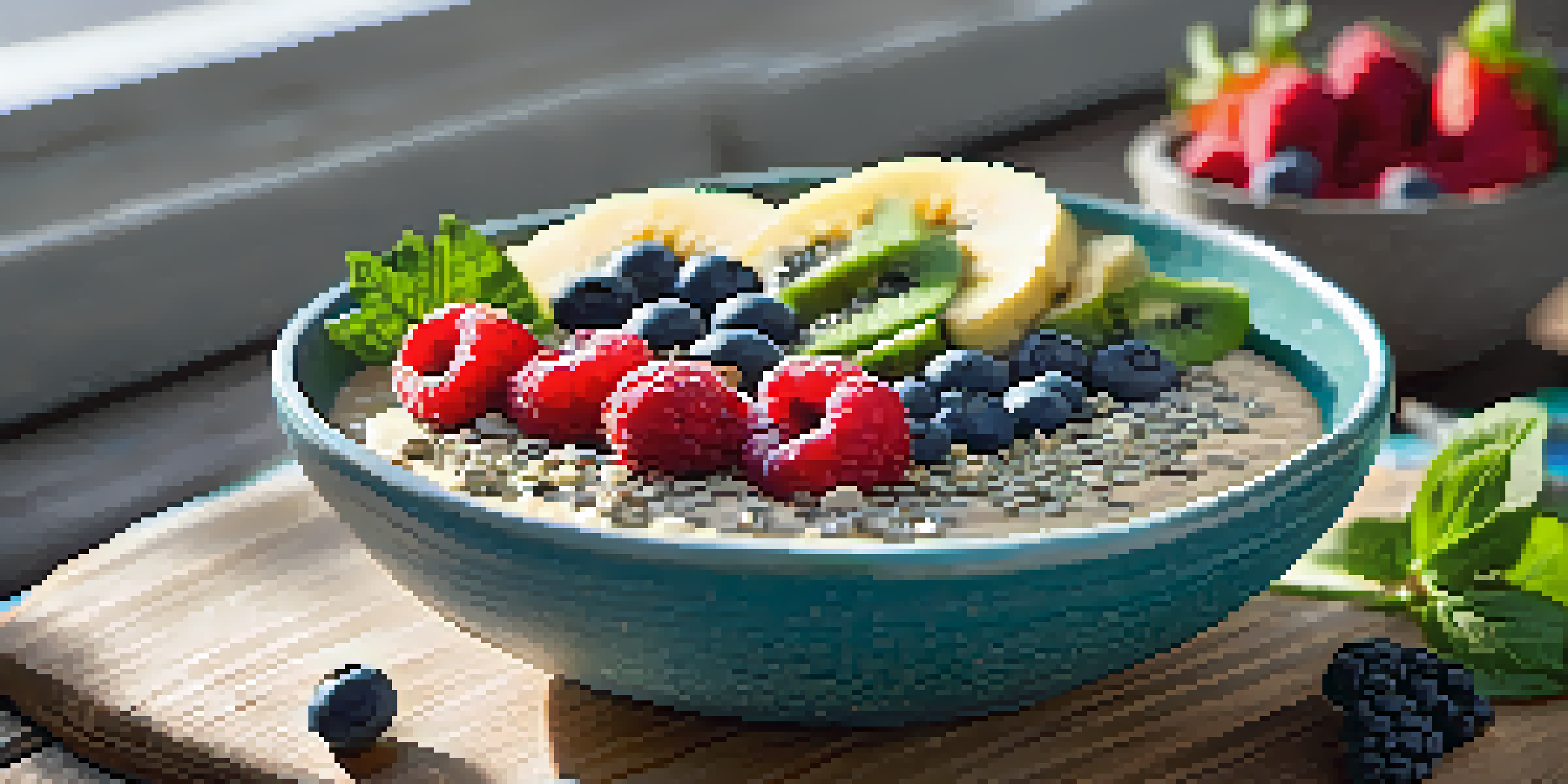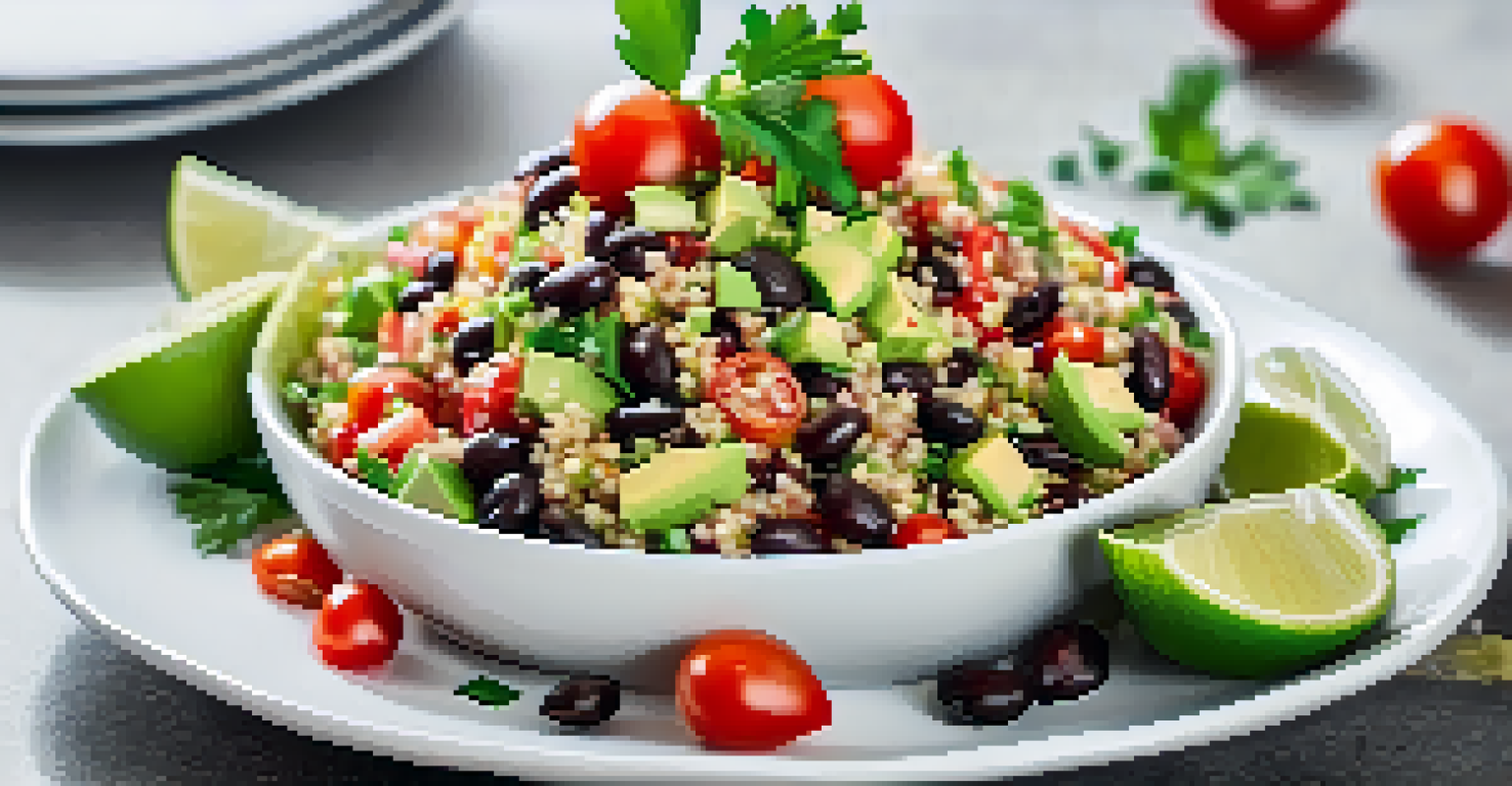Post-Workout Vegan Nutrition: Replenishing Essential Nutrients

Understanding Post-Workout Nutrition for Vegans
After an intense workout, your body craves nutrients to recover. For vegans, ensuring you get the right balance of protein, carbohydrates, and fats is essential. This period is crucial for muscle repair, energy replenishment, and overall recovery.
Let food be thy medicine and medicine be thy food.
Vegan diets can sometimes be lower in certain nutrients compared to omnivorous diets. Therefore, understanding what your body needs post-exercise is vital. It’s not just about eating anything; it’s about eating smart.
By prioritizing specific foods that are rich in essential nutrients, you can enhance your recovery process. Let’s delve deeper into what nutrients you should focus on after your workout.
The Importance of Protein for Muscle Recovery
Protein is a star player in the post-workout nutrition game, especially for muscle recovery. After exercising, your muscles undergo stress and need protein to repair and grow stronger. As a vegan, options like lentils, chickpeas, and quinoa are fantastic protein sources.

Unlike animal proteins, plant proteins can sometimes lack certain amino acids. However, by combining different sources, such as rice and beans, you can create a complete protein profile. This means your body gets everything it needs to rebuild muscle effectively.
Protein is Key for Recovery
Incorporating plant-based protein sources like lentils and quinoa is crucial for muscle repair after a workout.
Incorporating a protein-rich snack or meal within 30 to 60 minutes after your workout is highly recommended. Smoothies with plant-based protein powder or a hearty chickpea salad can do wonders for your recovery.
Carbohydrates: Fueling Your Recovery
Carbohydrates are your body’s primary energy source, and they play a crucial role in recovery. After a workout, your glycogen stores—think of them as your body's fuel tank—are depleted. Consuming carbohydrates helps refill these stores to ensure you’re ready for your next workout.
The food you eat can either be the safest and most powerful form of medicine or the slowest form of poison.
For vegans, whole grains, fruits, and starchy vegetables are excellent sources of carbs. Foods like sweet potatoes, brown rice, and bananas not only help replenish energy but also provide additional vitamins and minerals.
Pairing a source of protein with carbohydrates post-workout is beneficial. A smoothie with spinach, banana, and a scoop of protein powder is a perfect example of how to combine these macronutrients effectively.
Healthy Fats: Supporting Overall Recovery
While protein and carbohydrates often take the spotlight, healthy fats also play a vital role in recovery. They help with inflammation reduction and can support overall muscle recovery. Incorporating sources like avocados, nuts, and seeds can provide the essential fatty acids your body needs.
Fats are also a great source of energy, which is particularly important for endurance athletes. Consuming a small serving of nut butter or adding chia seeds to your smoothie can give you that extra boost without feeling heavy.
Carbs Replenish Energy Stores
Consuming carbohydrates from whole grains and fruits helps refill glycogen stores depleted during exercise.
Balancing your post-workout meal with all three macronutrients—proteins, carbs, and fats—will maximize your recovery and prepare you for future workouts. It’s all about harmony in your diet.
Hydration: The Unsung Hero of Recovery
Hydration is often overlooked, yet it’s an essential part of post-workout recovery. When you exercise, you lose fluids through sweat, which can lead to dehydration if not replenished. Drinking water or consuming hydrating foods can help restore your body’s fluid balance.
Electrolytes, such as sodium and potassium, are also lost during intense workouts. For vegans, coconut water, which is rich in electrolytes, is a delicious way to rehydrate. Additionally, fruits like watermelon and oranges not only hydrate but also provide essential vitamins.
Make it a habit to drink water before, during, and after your workouts. Keeping a water bottle handy can serve as a reminder to stay hydrated, ultimately supporting your recovery.
Vitamins and Minerals: The Micro-Nutrition Boost
Vitamins and minerals are the unsung heroes of recovery, helping your body function optimally. Nutrients like Vitamin C, Vitamin D, calcium, and magnesium play key roles in muscle repair and immune function. Vegans can find these in plant-based sources like leafy greens, nuts, and fortified foods.
For instance, leafy greens like kale are packed with calcium, which is vital for muscle contraction. Additionally, incorporating a variety of colorful fruits and vegetables ensures you get a broad spectrum of vitamins.
Hydration Supports Recovery
Staying hydrated and replenishing electrolytes is essential for optimal recovery after intense workouts.
Supplements can also be considered if you're concerned about deficiencies. However, it's best to consult with a healthcare provider before starting any new supplement regimen.
Sample Post-Workout Vegan Meals and Snacks
Creating a balanced post-workout meal doesn’t have to be complicated. Think of a hearty quinoa salad mixed with black beans, avocado, and a squeeze of lime for a refreshing kick. This dish not only provides protein and carbs but also healthy fats.
Smoothies are another fantastic option. Blend spinach, banana, a scoop of plant-based protein powder, and some almond milk for a quick recovery drink. It’s easy to digest and packed with essential nutrients.

Don’t forget about snacks! Hummus with whole-grain pita or an apple with almond butter can be great for those busy days when a full meal isn’t possible. The key is to keep it balanced and nutrient-dense.